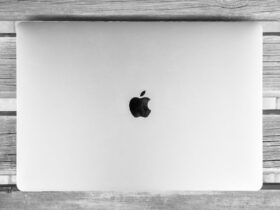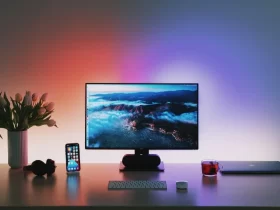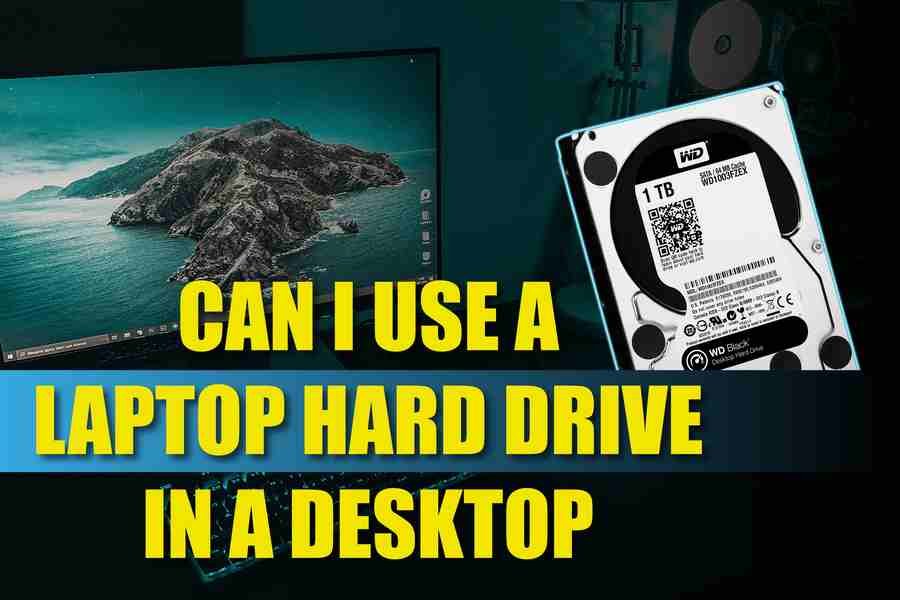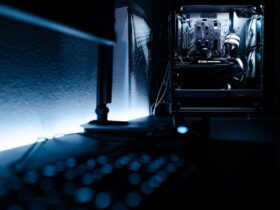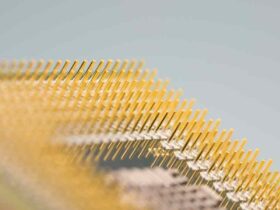If you have a laptop that is no longer working, you may be wondering if you can use the hard drive on a desktop. You can use a laptop hard drive on a desktop. In fact, there are many reasons why you may want to do this. Here we will discuss some of the benefits of using a laptop hard drive in a desktop computer.
Can I Use A Laptop Hard Drive In A Desktop?
Yes, you can use a laptop hard drive on a desktop. However, there are a few things you should keep in mind. First of all, the SATA interface on laptop hard drives is usually different than the SATA interface on desktop hard drives. So you’ll need to make sure that your motherboard has a SATA port that is compatible with the interface on your laptop hard drive.
What Factors Should You Consider When Choosing A Hard Drive For Your Desktop Computer?
- The primary factor is the size. Desktops typically require larger hard drives than laptops, so it’s important to make sure that the drive you choose will fit in your desktop case and be compatible with your computer’s system. Additionally, you should also consider the speed of the drive. Laptop hard drives usually have lower speeds than those found in desktops, so make sure to check the drive’s specifications. Finally, you should also look at the brand and type of hard drive.
- Different brands offer different levels of reliability and performance, so be sure to do your research before choosing the right one for your setup. Once you have selected a compatible hard drive for your desktop computer, you can begin the installation process. Installing a laptop hard drive into your desktop is relatively simple and can be done with basic tools.
- First, you need to remove the existing hard drive from your desktop and disconnect all cables connected to it. Next, insert the laptop hard drive into an appropriate bay in your computer’s case, then connect any necessary cables. Finally, boot up your system and install the operating system of your choice onto the new drive.
- Using a laptop hard drive in a desktop computer can be an easy and cost-effective way to upgrade or replace existing storage solutions. It’s important to consider the factors mentioned above when selecting a compatible hard drive for your setup, then follow the steps outlined above to successfully install it. With the proper preparation and care, you can enjoy the benefits of using a laptop hard drive on your desktop computer.
How Do Laptop Hard Drives Differ From Desktop Hard Drives?
- The most significant difference between laptop and desktop hard drives is their size. Laptop hard drives are smaller and designed to fit inside the limited space of a laptop’s chassis, while desktop hard drives are larger and have more room for components.
- Additionally, laptop hard drives tend to be less reliable than their desktop counterparts due to the increased likelihood of physical damage from drops, impacts, or other environmental factors.
- Finally, laptop hard drives generally have lower performance and slower transfer speeds than desktop hard drives. Despite these differences, laptop hard drives can still be used in a desktop computer with the proper preparation and care.
Which Type Of Hard Drive Is Right For You?
- Ultimately, the type of hard drive you choose should depend on your needs and budget. If you are looking for a reliable and fast storage solution, then desktop hard drives are typically the best choice. However, if you need a more affordable option with adequate performance, then a laptop hard drive can be an effective solution. Additionally, if you have access to a laptop hard drive and plan to install it on a desktop computer, then this can be an excellent way to save money while still enjoying the benefits of a high-performance hard drive.
- Regardless of the type of hard drive you choose, it’s important to do your research and make sure that it is compatible with your system. If done properly, you should be able to enjoy the performance benefits of your new hard drive for years to come.
- It’s important to consider the size, speed, brand, and type of hard drive when choosing one for your setup. Additionally, make sure to follow the instructions provided in order to properly install it. With the right hard drive, you can enjoy improved performance and reliability at a fraction of the cost.
- The goal is to provide an answer and explain how laptop hard drives differ from desktop hard drives, as well as offer tips for determining which type of hard drive is best for a given situation. By researching the options and following the instructions provided, you should be able to enjoy the benefits of a new drive in no time.
How To Install A New Hard Drive In Your Desktop Computer?
- Installing a new hard drive in your desktop computer is relatively simp When replacing an existing hard drive with a laptop hard drive, make sure it is compatible with your system and environment. Additionally, you should be aware of the differences between laptop and desktop hard drives.
- Laptop drives tend to be smaller and require more care in order to function properly. Once you have chosen the right hard drive, make sure to follow the instructions provided in order to safely install it and get your system up and running.
- Begin by disconnecting any cables that are connected to your existing hard drive. This includes power cables, data cables, USB connections, etc. Once all the cables have been disconnected, you can now remove your existing hard drive from the computer’s chassis. Generally, this is done by unscrewing four or five screws at the back of the hard drive. After removing your old hard drive, simply place your new laptop hard drive in its place and re-attach any cables. Secure the hard drive in place with the screws that you removed earlier.
- Connect the power and data cables to your new hard drive, then boot up your system. Finally, make sure to check for any updates or software patches that may be available for your new drive. This will ensure optimal performance and reliability over time. By following these simple steps, you should be able to properly install a laptop hard drive on your desktop computer with minimal effort.
- With the right preparation and care, you can enjoy the benefits of a high-performance hard drive at a fraction of the cost. Ultimately, if you want to use a laptop hard drive on your desktop computer, it’s important to make sure that it is compatible and properly installed. Additionally, you should be aware of the differences between laptop and desktop hard drives before making a purchase. With the right know-how, you can enjoy improved performance and reliability at a fraction of the cost.
Tips For Keeping Your Hard Drive Healthy And Preventing Data Loss
- Use reliable antivirus software to protect your system from malicious viruses, malware, and other threats.
- Regularly back up your data by copying important files onto an external hard drive or storage device.
- Make sure that your operating system is up-to-date with the latest security patches and updates.
- Avoid using your computer in extreme temperatures or environments, as this can cause damage to the hard drive.
- When transferring data between drives, be sure to use the appropriate connection type and cables.
- Remember to regularly clean up your system by deleting any unnecessary files or programs that are taking up space on your hard drive. By taking the time to properly maintain your laptop or desktop hard drive, you can enjoy years of reliable performance.
- In addition, regularly backing up important files and using antivirus software will help protect your data from being lost or corrupted. Taking these simple steps can save you a lot of headaches in the long run and ensure that your system continues to operate at its best.
- Overall, whether you choose to use a laptop hard drive on your desktop computer or not, it’s important to understand the differences between the two types of drives and how they can affect their performance.
- With the right preparation and maintenance, you can ensure that both your laptop and desktop systems are running at peak efficiency for years to come.
- By following these tips and taking the time to properly install your laptop hard drive in a desktop computer, you can enjoy improved performance without sacrificing reliability or data security.
Conclusion
While a laptop hard drive can be used on a desktop computer, it is not recommended. Laptop hard drives are designed to be more energy-efficient and have slower data transfer speeds than desktop hard drives. Additionally, laptop hard drives are typically smaller in capacity than desktop hard drives. If you need to replace your desktop’s hard drive, it is best to purchase a dedicated desktop hard drive.




